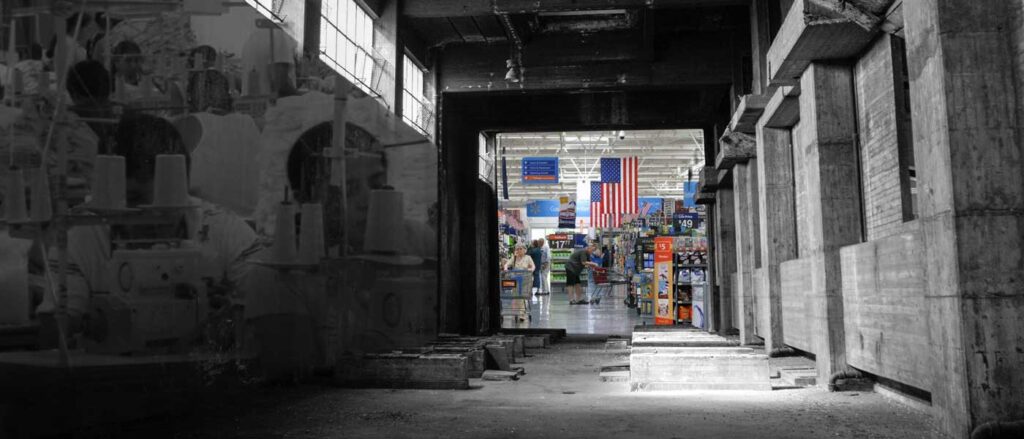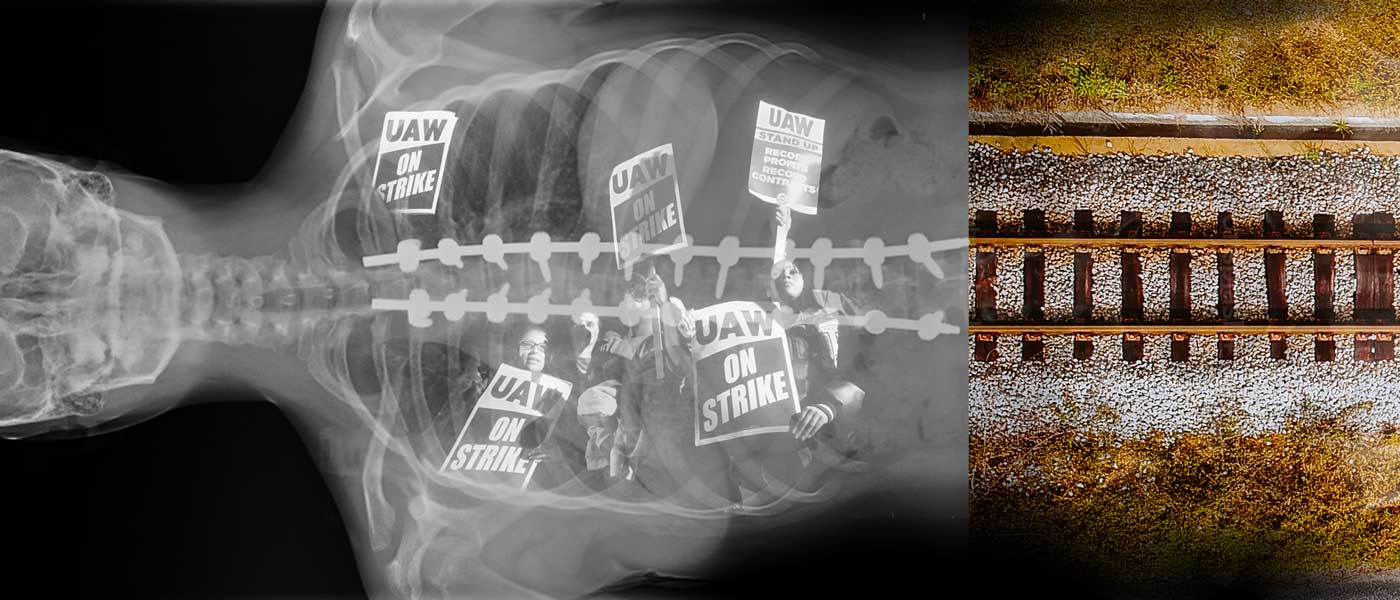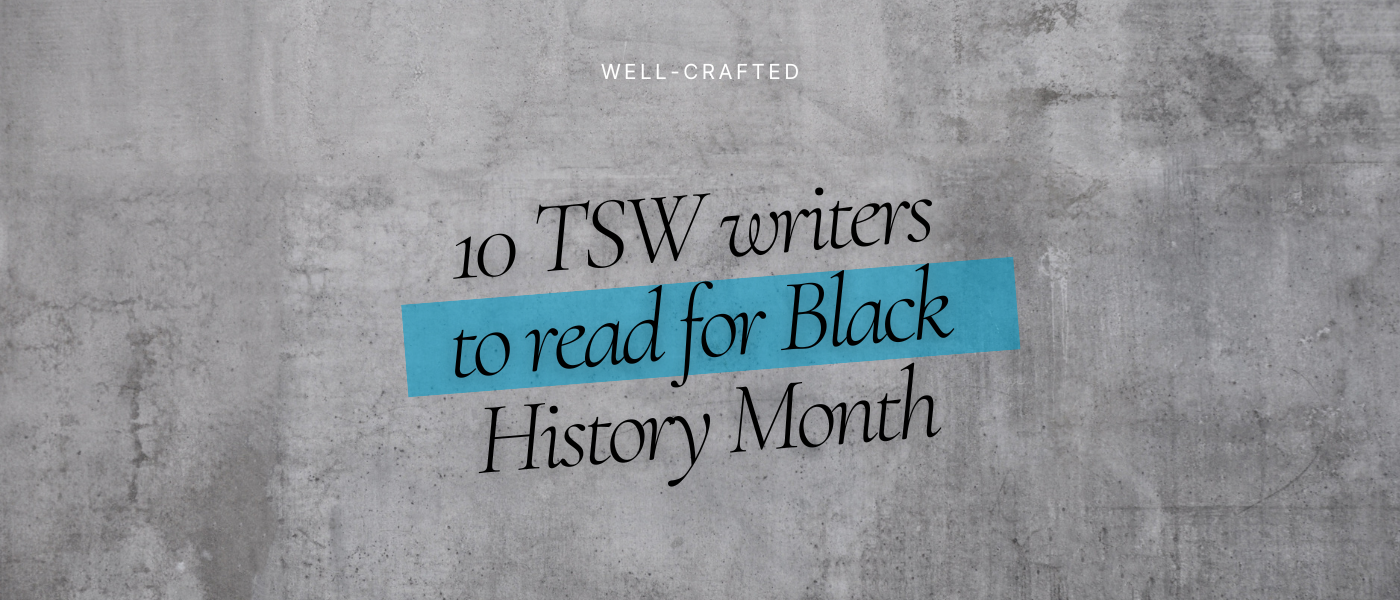First, you wait.
Wait a year, or two, or ten. Or maybe you’ll wait two decades — squeezing through the cracks in eVerify and RealID until the bureaucratic walls grow too high and you must go under. Don’t forget to carry your first deportation order and stack of expired work permits to every cold and creaky sublease of your twenties. All the important details of your life are floating in the cloud anyway, split between hundreds of power-guzzling servers between two oceans, but you hold tight to your papers and wait like a good immigrant.
Be patient. Watch five American presidents enter the White House, drunk with power and full of promises. Watch four American presidents leave the White House, hungover with scandal and war crimes. Hold off on school and career and dentist appointments and funerals and weddings. Tell everyone the same sorry stories at the events you do go to: It’s impossible to take a loan out by yourself, there’s the ten-year ban to reenter, it’s too awkward and humiliating to explain your precarious status — can’t legally work, can’t legally drive, can’t legally stay — on the third date so it’s not worth the trouble. Cobble together a living by taking up part-time gigs, responding to ads on Craigslist, and selling your data to corporations that can maximize extracting your true value. The market’s parasitic interest in your spending capacity seems flattering compared to the country’s flat rejection of you in general.
The years will trudge on and your life will slump under the weight of your waiting, but you must try to remain optimistic like a good American. To stay busy, you will cultivate delightful delusions about the person you could be after this strange period of your life is over. You could become a landscape photographer, a pilot, a person who safely indulges in parkour with the knowledge that they have health insurance. It keeps you childish, all this potential that will never turn into momentum.
No one says anything about your emotional regression and plummeting foresight until your best friend of fifteen years finally calls out your perpetual tardiness on a Thursday night. You were late to dinner, again. She waved you into her apartment saying it didn’t matter, but now that a pile of dirty dishes and a bowl of sliced honeydew and cantaloupe divides the two of you, you’re not so sure. It would be devastating to lose your extraordinary friend to failures of attention and timekeeping. Sometimes, when you realize in the middle of the night that you didn’t respond to yet another “how are you?” missive because you once again didn’t know what to say to that, you think of showing up to her door with a bottle of wine and a bag of soggy takeout to apologize and explain yourself. But you never do because her boyfriend stays over all the time and you wouldn’t want to interrupt his sleep or worse — risk him interrupting your conversation. More and more, you feel self-conscious about how your desire to be close to her has not changed but she has. It is not her fault she has other people in her life and you do not.
Your friend abruptly announces, “I think you’re depressed.”
You take a chunk of each melon and chew both at the same time, hoping the fusion of two similar but distinct flavors will bring a unique tasting experience. It doesn’t. Your friend looks expectant, but you are only thinking how funny she is when she tries to be serious. You have spent so much time waiting for this country to reform, for the rain to come, for winter to end, and for what? Things are fine as long as she’s around and it’s just the two of you goofing around.
“I don’t think so,” you tell her. Then you suggest trying both fruits at once.
As you step out of her building, you run into your friend’s boyfriend and exchange small talk on the stairs. He discloses that he’s planning on proposing to your friend soon. He inquires after her preferences and your blessings. You give them both freely — your friend deserves all forms of happiness. With stunning ease, you can envision the trajectory of your friend’s life because she is brilliant and beautiful and destined for great things; meanwhile, you can barely picture the next day of your own life. It’s as if your timeline has fallen out of sync with the rest of the world’s, as if you’ve fallen so far behind your peers and catching up will remain impossible.
After many years, it will dawn on you that you are not waiting for Congress, you are waiting for yourself to become crooked and hopeless enough to become capable of leaving. Slowly, painfully, inevitably, the circumstances of your life will catch up to you until one afternoon, you will wake up in a dim room and wonder how you lasted this long. You will peel yourself out of bed, pick a date, and buy a suit.
Second, you face Immigration.
On a Monday of your choice (wearing clothes you have also chosen), you’ll walk into the regional office of the Department of Homeland Security. Years ago, you watched a documentary on cows being readied for slaughter and you recognized their confused, fearful gaze as your own through the display monitors of countless security cameras. Now, years later, you peer into the same screen; your eyes merely look dull, like a cow’s after its brains have been scrambled with a metal prodding gun in an abattoir.
When the baby-faced officer waves you through the metal detector and asks you which office you’re heading toward, you know exactly which floor and what cubicle they’ll process you in. You’ve been here before. You’ve done this a dozen times for DACA before the previous president finally made good on his promise to ax it, and you remember the protests, how people fussed and fumed for three weeks before something else urgent and unjust overtook the national limelight. You remember the rage and also the relief — relief because you were at last free of the guillotine that hung above you, because some awful clarity finally sliced through all those years of maybe, if you’re good, if we feel like it, and the legal revocation tasted more like a cure than a poison.
When the elevator opens and the receptionist waves you forward, you’ll say, I would like to turn myself in for deportation.
When the receptionist tells you that you are in the wrong place, they don’t do that here, this is for biometrics only, try “Immigration and Customs Enforcement” on floor eight, you thank her and go downstairs and repeat yourself.
“Do you have a deportation order against you?” asks the person on floor eight. You give him an expired driver’s license and the deportation order that you do have, the one that has haunted you for longer than it has existed.
“This isn’t yours,” he says. He’s right, technically. The papers are addressed to your parents, not that it matters to them — they don’t live here anymore. “I wasn’t supposed to be here either,” you say.
“Unfortunately, a discretionary grant of voluntary departure is only relevant to people in custody. As you do not have a current or outstanding deportation motion against you, there’s not much we can do,” he says.
“Can you file one for me?”
“We are currently prioritizing the removal of criminals or repeat offenders —” he begins to explain. You cut him off.
“So you want me to commit a crime, then?”
Your own disdain and brusqueness toward a customer service employee doing their job surprises you a little.
“Miss, you are free to leave the country as you please.”
In your head, you go through the list of your personal lows, the things that could be flagged as criminal within certain shades of the law: Contributing five dollars to a senate campaign a decade ago because you didn’t know that you would be a foreign national interfering with democracy, driving without a permit, driving under the influence, driving over a hundred miles per hour that one time, being cruel to your parents.
“Listen,” the receptionist says. He scans the empty waiting room. “I can tell you’re young. It’s not your fault your parents broke the law. You remind me of a gal my son went to school with. It’s real unfortunate that good kids like you are in this situation, but you’re not helping yourself by coming here like this.”
Your body heats up at this insipid take. It’s insulting to be seen as a child when you are more than old enough to have one yourself. You have already dissected the “good immigrant kid, bad immigrant mommy” dichotomy spouted by every hopeless lip-service legislation. You have already deconstructed the framing of who is entitled to citizenship and who must beg for it. You have already analyzed the national amnesia behind who exactly started the wars, plundered the resources, and overthrew the governments elsewhere to necessitate so many of you coming here in the first place. But America isn’t ashamed of its imperialism, so you won’t apologize for squatting.
“All right,” you say.
You walk back to the elevator, past security, through the revolving doors. You step into the stark sun, no ankle trackers or hand shackles or deportation orders in sight. If you want to leave a country that doesn’t want you, you’ll have to do it yourself. In the parking lot of the USCIS office, you book a flight on your phone.
It takes six minutes.
Third, you go to Walmart.
You could have ordered everything online and a drone would have dropped your items off in four hours or “your money back guaranteed,” but you craved the full Wally World experience. You wanted to glide down the cool, fluorescent aisles and pick up bags of candy, rub the sleeves of polyester sweaters, flip through cheap paperbacks. Time and weather don’t exist inside a Walmart, but cell reception does. Your phone vibrates with your mother’s name. She’s calling from another time zone.
You answer in the language she knows best and you know barely. Now that you are an adult, your mother speaks to you over the phone with soft authority and sudden humor, neither of which were displayed during your childhood. You ask about her health and she asks about your upcoming flight. She tells you not to be nervous. She likes giving impractical advice: don’t be stressed, don’t be sad. You pretend to heed it. She asks where you are and when you answer, she says,
“Walmart! Remember when I lost you there? I searched everywhere. Eventually, a kid moving shopping carts saw me crying while I kept circling the parking lot. He took me inside to customer service and there you were, sleeping behind the counter. Someone had taken you there because you were lost. When they asked you for my name, you kept saying ‘Mom’ because you didn’t know my name. I didn’t know enough English to realize that they had been calling for me over the intercom the whole time. I still don’t.”
You were four then, this being right after your family had immigrated. You don’t remember the incident firsthand, but you like hearing the story of how your mother came back for you. You remember how grocery runs were always a group activity in your household, how there would be months of only traveling between school and Walmart and home. Little did you know that those days would turn out to be the good times, that you would fall asleep wishing that you were small and in the back seat again, listening to your parents bicker on the way to Walmart.
Before your mother ends the call, she asks you to pick up some vitamins because they’re cheaper there. You let her go and you return to your shopping list. You pick up boxed wine. Handles of vodka and six-packs of beer and two bottles of the cheapest champagne. Frozen mini pizzas and mini corn dogs and mini quiches. Chocolate peanut butter cups because they are your best friend’s favorite. With each addition, your cart gains momentum.
In the pharmacy section, the lightness of your nostalgia begins to churn into a familiar anxiety. Walmart is both a living monument of your boring rural childhood and the crux of many evils: the costs simply don’t add up. Before you lost your scholarship and dropped out of college, you sat in lectures with rapt desperation, hanging onto every word on Marxism and congealed labor and the co-optation of race and borders and citizenship. You cared about being politically correct then, thought policies would save you, thought the distinctions between labels like “illegal” (bad) and “undocumented” (inaccurate) and “illegalized” (bingo) mattered, and you took great care to categorize yourself properly. You don’t think about those words anymore; they don’t have any sway over you when you’re about to quit America.
Somewhere between the fish oil and melatonin aisles, your sentimentality gets the better of you, so you briefly abandon your cart to go on a pharmacy ride detour. You step into a Dr. Scholls’s orthotics machine. You shove an arm down a blood pressure monitor machine. As the inflatable cuff tightens around your left bicep, you marvel at how all the Walmarts have the same identical layout. You hate Walmart because you should — you’ve held onto your anti-capitalist principles, after all — but you love the familiarity of this place, the way all Walmart entrances begin near the produce and end with clothing and plastic jewelry. Once, your best friend called from Los Angeles to complain about how it took her three trips to buy toilet paper, a tube of tomato paste, and a pillow. Here, it’s all in the same place. If there was a heaven, you think, it would probably look a lot like Walmart: everyone you love and everything you need in one place, within arm’s reach.
Before you check out, you grab a headlight and twenty cans of lighter fluid.
Fourth, you throw a pity party.
After giving away the few furniture items and plants you possess, you’ll guilt the recipients of your redistributed inventory to gather at your place in lieu of payment. You take three shots of tequila before anyone shows up because that’s when you’re the most fun.This small, throat-burning sacrifice is necessary preparation because you are the host, the mood-setter, the cause for this going-away celebration. If you look like you’re having a bad time, everyone will follow suit and then you will have accomplished the truly unforgivable: thrown a shitty party and wasted everyone’s time. You want to go out in a drunken splendor, want everyone to kiss and cry and promise things they can actually deliver, like calling their grandparents or finally opening a retirement account.
But of course, you overdo it. Two hours later, you’re the only person who isn’t sober. Half your friends are cursing the government and the other half are slouched against the wall, mumbling condolences, trying to be polite and non-partisan. Everyone’s drinks are full and their plates are sparse. The vibes are rancid. Agitated, you scramble up the last chair remaining in your studio.
“Evening, comrades! Thank you for coming. I expected you all to pregame for this but no matter,” you slur. You gesture with your drink and start rambling. In the periphery, your best friend’s face twists with exasperation and you smirk because there’s nothing you love more than annoying her with your theatrics.
“I know,” you continue. “But here’s the thing! The motherland will not be so terrible. Countries with universal healthcare and affordable public schools do indeed have their pitfalls! The taxes will be higher and the salaries will be lower, yes. But life isn’t all about financial gain, friends. It will not be so —” (you burp) “— awful.”
“Bitch, shut up,” your best friend shouts. “We’re sad because we’ll miss you!”
“I’m not done,” you shout back. “A toast! I want to make a toast!”
You make serial killer eyes at everyone in the room until they reluctantly hold up their drinks. “I hate this country so much,” you say, meaning every word. “And I love you all so much,” you add, holding back messy drunk girl tears. You continue.
“This is actually a happy occasion. Imagine: I’m finally leaving a super terrible, toxic relationship with a power-trippy maniac who threatens to kick me out every day. Except instead of a person, it’s a nation-state.”
“To leaving nation-state fuckers behind,” your best friend hollers, and you scream “Yes, exactly!” and chug your assent. You keep pouring and drinking until everyone gives in and gets drunk-sad and hysterical-happy with you.
You’ll wish that everyone could stay in this room forever, but of course they won’t. They can’t — eventually they kiss your forehead and collect their things from the pile by the door and leave for their own beds, one by one. When you finally lift your head, it’s two in the morning and you’re on the floor, curled under a coat that’s not yours. Your best friend has cleaned up all the red cups and paper plates on your behalf, and she is now mopping the sticky kitchen floor. The sweet smell of her perfume on her winter coat makes you feel even more drunk. If she was dealt your cards, she could endure it, you think. Unlike you, she carries herself with the self-assurance of someone who knows they belong to themselves. You make a disgruntled sound and she slides next to you, her face upside down. Your best friend, your kinder and hotter and smarter half, the one friend who didn’t abandon you after getting married. You say this out loud.
“Marriage doesn’t mean I have to renounce friendships, moron,” she says. She sighs and closes her eyes. “What are you going to do over there?”
“Hang out with Mom and Dad. Teach English. Get paid to write rich kids’ college essays. Save enough money to get a boob job and then marry rich because I won’t have any friends over there so I might as well. Profit.”
Your friend rolls her eyes. “No, really.”
“Dunno. Just going to live,” you say, drifting back to sleep.
You tried living here but you are finally ready to admit to yourself that it has all become too difficult. Once, you explained to your friend what Deferred Action for Childhood Arrivals really meant: the government was just stalling, it was never meant to solve any part of your predicament. But all the while, you were stalling too. The thought of asking your friend to care for you felt intolerable, loathsome even, and instead you continued to love your friend in secret until that too became too lonesome. It whittled down your self-respect, hardened you in ways that made you look ugly even to yourself.
Even undeserving immigrants like you should get to rest every now and then.
Finally, you drive west.
At long last, you are ready to take care of business. You’ll drive through the night, playing yacht rock and licking Hot Cheetos powder off your fingers. When the fog of sleep creeps closer, drive faster and recite the facts from the naturalization test to stay awake. Tax Day is April 15. The national anthem is “The Star Spangled Banner.” There are twenty-seven amendments to the Constitution. Somewhere in the American heartland, there is an abandoned factory devoid of windows and warmth.
And that factory is special to you. It is a place that once produced seat belts and stamped all their packages with a Made In America seal until an ICE raid shut it down. The town where those factory workers once lived shrunk in real life and expanded in the space between your ribs until it became the ghost town it is now, and you became another restless apparition haunting it. At least, that’s what you’ll tell yourself as you drive around your hometown for the first time in years. You turn off the music and the GPS. The town’s sole grocery store, a place where your parents could never find the right vegetables or spices, has aged poorly even in the dark. You drive past the four-block stretch that makes up town, past the sunflower patches and cornfields, and make a left on a gravel road. You park outside the factory your parents toiled in for twelve years. Turn off the car lights. Step out and stretch under the moon.
You stand for a moment, letting your eyes adjust before scanning the empty space in front of what used to be a door. Your parents would eat lunch and smoke and mingle with their fellow immigrant coworkers by the picnic table a few yards away. They stayed in this town and worked in this factory even after you left for school. You suggested that they move to the city too, that there was no reason for them to stay behind, but they always resisted. They liked the countryside. They said it was peaceful. And truthfully, you liked the distance. You began to appreciate the freedom of living in a real city, far from your parents’ anxieties and expectations. Who could blame you? How could you not regret leaving them when they would soon be taken?
You study the lifeless building made of wood and steel. For years, you felt it was unfair that this structure remained standing even after all the people who once brought it to life were shipped off. It shouldn’t have surprised you. The only thing sacred in this country is property after all — but looking at the building still makes your insides burn. You click on the headlamp, take out the box of lighter fluid from the trunk and approach with a determined stride. You run your hands over the windowless siding and listen for raccoons, skunks, robins. Animals you won’t see for a long time.
You don’t believe in justice. Not really, not anymore. But you came here for a reason. You spray the walls of the old factory in fuel.
“I know this is pointless,” you say to the building, to the moon that hangs low and bright, to no one nearby. You gather sticks and wood scraps to make a trail leading several feet away from the building. Douse the path with lighter fluid.
“It’s not your fault or my parents’ fault or any one thing,” you say.
“It’s just. Every day they used to be so scared of living and working here. Every single day. They were afraid of everything — of getting injured, of me getting sick, of not being able to see me, see each other. Afterward, they told me they should have left sooner. Shouldn’t have come here in the first place.”
You walk back to the far edge of the trail of flammable debris.
“I miss them,” you confess. “Sometimes I think I might die from missing them. If I stay here, I won’t even be a person anymore.”
You take a step back. Light a match. Above you, the faint glow of morning peaks on the horizon. Below you, a tiny flame crawls toward your hands. You imagine the matchstick growing into a great fire, chasing you like a police siren, telling you to go.




